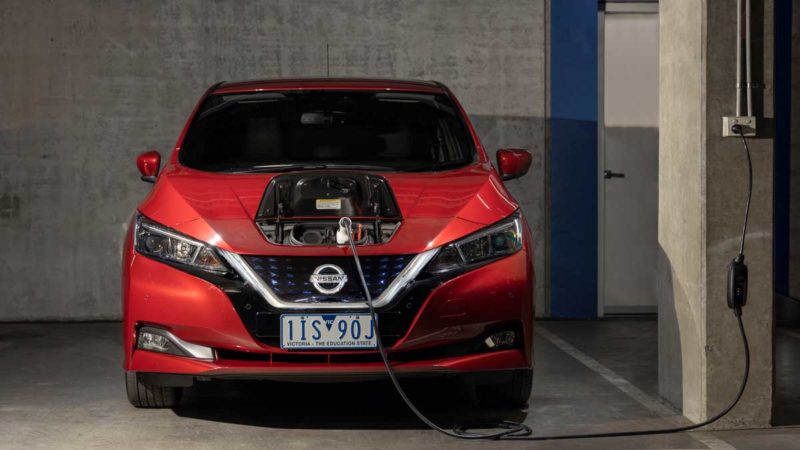Major utility AGL, backed by the Australian Renewable Energy Agency, is to conduct a series of electric vehicle charging trials, including the first to use privately owned EVs to power homes and put energy back into the grid.
The $8.25 million three-year program, due to start next year, will involve up to 300 electric vehicle owners in a series of different trials, and will feature several firsts for Australia.
The project will be the first time vehicle-to-grid EVs will be deployed in a residential context in Australia, the two organisations say. It will also be the first time smart charging has been deployed in Australia by a utility via software, potentially removing the need for additional smart charging hardware in the future.
A total of 200 smart charges (worth $2,500 each) will be installed at EV owners’ homes, where they will be remotely monitored and controlled to help move charging to off-peak times when cheap renewable energy is available or to respond to constraints on the grid.
Another 50 EV owners (Tesla cars only) will use a software based smart charging trial to test the ability of EV charging to be controlled by communicating directly with the car without the need for separate smart charging hardware.
And another 50 EVs (Nissan Leafs only) will participate in a vehicle to grid (V2G) trial – receiving bi-directional chargers at a discounted price to assess the ability and commerciality of EVs to become a source of energy storage and provide energy back to the grid when required.
AGL’s head of decentralised energy resources Dominique Van Den Berg says this will be the first time in Australia that people could use their EVs to power their houses and export excess energy to the grid.
“This trial will demonstrate how we create value using customers’ distributed energy assets like batteries and share the value with them,” she said. “Although the trial is limited to 300 customers, it will help us to shape future energy offers to EV owners.”
It is also part of AGL’s plans to harness up to 350MW of distributed assets such as home batteries and EVs by 2024, compred with 72MW now. All up, including big batteries, AGL plans to deploy 1200MW of battery capacity (with various lengths of storage), inlcuding its newly announced 250MW big battery in South Australia with up to four hours of storage.
“AGL’s Virtual Power Plant, which consists of household batteries providing energy when the grid needs it, such as on hot summer days, is being expanded with this trial to include EVs, which are essentially batteries on wheels,” Van Den Berg said.
“AGL is investing in renewable and flexible generation supported by storage technology including residential batteries and grid-scale batteries that provide firm capacity for our transition from coal to renewable energy.”
V2G charging is considered a huge opportunity as more drivers adopt electric vehicles, and grid operators, network owners and energy retailers are looking at the options, impact and potential benefits of having a huge resource of “batteries on wheels” that could provide power and other essential services to the grid.
Other trials have also been announced, but these have been focused on government or company fleets. Only one fully electric vehicle, the Nissan Leaf, offers V2G capabilities in Australia, although the relevant standards have yet to be approved for their widespread use on the Australian grid.
ARENA will contribute $2.9 million to the trials – to be conducted across NSW, Queensland, Victoria and South Australia – which will also involve Jet Charge, Chargefox and FlexCharging and a number of distribution networks. ARENA’s funding will support charging hardware costs, installation costs and software development.
“As more Australians switch to EVs, it will be important to manage and orchestrate EV charging to avoid potentially costly impacts on peak demand, associated network charges and grid security issues,” ARENA CEO Darren Miller said in a statement.
“EVs also provide economic opportunities for consumers through the potential of reduced electricity costs through higher network utilisation and the potential to generate revenues that would reduce the cost of car ownership.
“We hope trials like this will provide valuable insights into how EVs can provide value for money for consumers, but also help to transition our electricity network going forward.”
The trial also will help to inform electricity retailers, customers and DNSPs of the potential for EV charge management and how those benefits can be recognised and valued.
You can find more information here.

Giles Parkinson is founder and editor of The Driven, and also edits and founded the Renew Economy and One Step Off The Grid web sites. He has been a journalist for nearly 40 years, is a former business and deputy editor of the Australian Financial Review, and owns a Tesla Model 3.


